Table of Contents
Introduction
Bakuchi (Psoralea corylifolia) is a plant known for its medicinal value and grown in different parts of the world with tropical and sub-tropical climatic conditions. While Bakuchi or Babchi is its trade name, the plant is called by various names in India. The plant is useful both externally and internally.1,2
Other Names Of Bakuchi Are:
- Babchi or Bavanchi in Hindi
- Anindavi, Kamboji or Avalguja in Sanskrit
- Baukuchi in Kannada
- Bhavanji in Telugu
- Bavachi in Gujarati
- Bavachya in Marathi
- Karkokil in Malayalam
- Karpokarisi in Tamil
- Babechi in Urdu.
The entire plant is helpful to prepare medicines for various illnesses. Its roots, leaves, stems and seeds are useful to prepare medications for skin diseases, and that is why it is called ‘Kushtanashini’ (leprosy destroyer).3
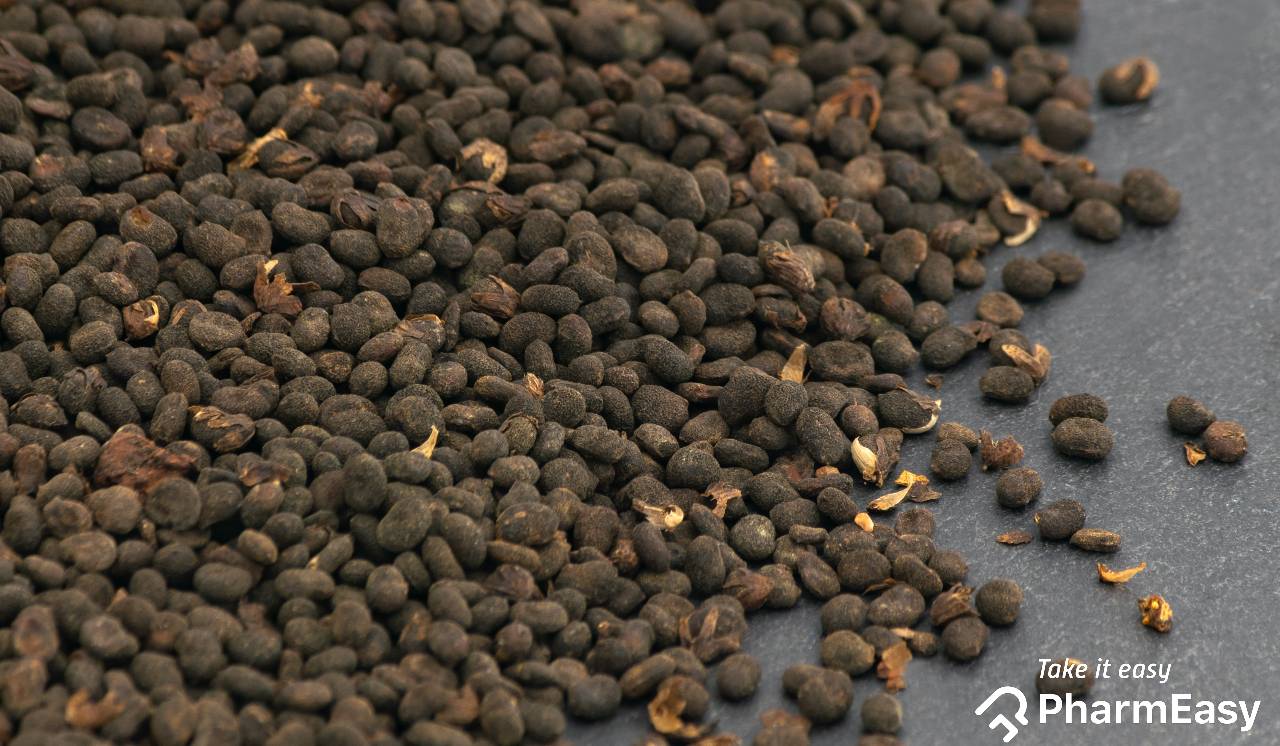
Did you know?
- Bakuchi oil has shown potential in treating skin conditions such as vitiligo, with a success rate of 70-80%. source: pubmed.ncbi.nlm.nih.gov
- The active compounds in bakuchi, such as psoralen, have been found to have anti-cancer properties. source: cancer.gov
- Bakuchi extract has been used in the treatment of psoriasis, with significant improvement in symptoms observed. source: ncbi.nlm.nih.gov
- Bakuchi has been found to possess antimicrobial activity against various pathogens, including bacteria and fungi. source: pubmed.ncbi.nlm.nih.gov
- Studies have shown that bakuchi can help in reducing oxidative stress and protecting against DNA damage. source: ncbi.nlm.nih.gov
Therapeutic Uses of Bakuchi:
Some of the properties that make Bakuchi a suitable candidate to prepare medications are:
- The antibacterial property of the plant is beneficial for skin diseases caused due to Staphylococcus aureus, and S. epidermis.1
- Anti-inflammatory of Bakuchi is beneficial for skin ailments like leprosy and leucoderma.3,4
- The anti-inflammatory nature of Bakuchi oil helps to manage conditions like dermatitis and oedema.3
- The plant has antioxidant and anti-inflammatory properties that can help to purify the blood and manage ringworm, scabies, and dermatosis with fissures.3
- The plant’s seeds can be used as an antidote to snake venom and scorpion sting due to its anticoagulant effect.3,4
- The extract powder and seeds are used to deal with various ailments like constipation and wounds and act as a diuretic.
- The seeds possess anti-inflammatory and deobstruent (removing obstruction) properties to manage respiratory illnesses like asthma and cough.
- The other property of the plant is its ability to manage reproductive conditions like impotence by acting as an aphrodisiac, menstrual disorders and abnormal uterine bleeding.
- The plant has the property to manage conditions like frequent urination and bedwetting.
- The bone calcification property of the plant is helpful to manage bone disorders like osteoporosis and bone fractures.3
- The plant’s leaves are used to manage diarrhoea due to their antibacterial property.
- The fruit has hepatoprotective, anti-inflammatory and stomachic properties useful for managing liver disorders, bronchitis and nausea, respectively. It can also help manage lower backaches, febrile diseases, anaemia and improve the skin complexion.3,4
- The plant also has anti-cancer properties, which inhibit the multiplication of lung cancer cells and osteosarcoma.
- It can improve digestion and has antipyretic (reducing fever) and anti-venom properties.3
- As per an animal study, its seed extracts show antihelminthic properties against Ascaridia galli, an intestinal parasite of poultry.
- The plant has an excellent antidepressant property.
- The seeds of Bakuchi have been found to have antiviral activity against severe acute respiratory syndrome coronavirus (SARS-CoV). It is found to inhibit the replication of the virus.
- The plant possesses antiobesity activity. It acts on the adipose tissue to help in reducing weight and food intake, according to studies on animals.
- The plant has anti-Alzheimer’s activity and has demonstrated therapeutic ability to manage neurodegenerative diseases.
- The seeds also have analgesic, antidiabetic, diaphoretic (increases perspiration) and coronary vasodilatory activity.4
I recently read an article that says, due to its Keshya quality, Bakuchi churna may help with hair growth and reduce dandruff when administered topically in Ayurveda. From my perspective, the use of Bakuchi churna should be done for awesome, long tresses. The quality and lustre of hair may also get enhanced. Grey hairs might also reduce with its regular use.
Dr. Siddharth Gupta, B.A.M.S, M.D (Ayu)
Benefits of Bakuchi:
1. Benefits of Bakuchi for Skin Diseases
- Bakuchi seeds have been used to manage various skin diseases like leucoderma, a condition of discolouration of the skin.
- The extract may be used in ointments or gels for topical application.
- Bakuchi can be used for managing psoriasis and itches associated with the condition.
- Bakuchi can also be consumed to deal with leprosy.5
- The oil from the seeds is used to deal with Tinea versicolor, scabies and ringworm.4
2. Anti-cancer Activity of Bakuchi
The Bakuchi extract is found to be effective in destroying the cancer cells of osteosarcoma and lung cancer.3
Bakuchi extract can also destroy the cancer cells containing multi-drug resistant the Human papillomavirus.6
3. Benefits of Bakuchi for Dental & Bone Disorders
- The extract from the roots of the Bakuchi plant can manage various dental disorders like dental carries.
- In addition to this, it is beneficial for dealing with osteoporosis and bone fractures as it can boost bone calcification.4
4. Benefits of Bakuchi for Reproductive & Urinary Problems
- The fruit of the Bakuchi plant is used to prepare tonic to use as an aphrodisiac.
- It is also used to treat incontinence in men, frequent urination, premature ejaculation and impotence.
- The seed extract helps to soothe the symptoms of abnormal uterine bleeding and menstrual disorders in women.
- In addition to this, the seed extracts help manage spermatorrhoea and premature ejaculation in men.4
Also Read: Punarnava – Uses, Benefits, Side Effects & Precautions
5. Benefits of Bakuchi for Gastrointestinal Disorders
- The powder from the seed extract is used to relieve the symptoms of constipation, manage parasitic intestinal infections, and improve appetite.
- The leaves can be used to make medicines to manage diarrhoea, and fruits are good to deal with piles and nausea.4
In this 5G era, we constantly struggle to walk parallel to the fast-growing world. But with this, stress and anxiety has become a common complaint. From my experience, Bakuchi may do wonders for our minds and overall health! I recently read an article which suggests that Bakuchi may have antidepressant qualities. Bakuchi is believed to lower the plasma levels of the neurotransmitters adrenaline and norepinephrine, eventually decreasing stress levels.
Dr. Rajeev Singh, BAMS
Also Read: Munakka – Uses, Benefits, Side Effects & Nutritional Value
How to Use Bakuchi?
The Bakuchi plant is used to manage different kinds of diseases such as:
- Leucoderma – Oral therapy is combined with topical application of ointment on the lesions of leucoderma. The ointment is prepared by mixing the seed powder of Bakuchi with Haratala Bhasma and cow’s urine.2
- Scabies and ringworm – The seed powder is mixed with buttermilk to prepare a paste.1
- Leprosy – The seed oil may be consumed orally along with the betel nut leaf.1
- Chronic skin conditions – Bakuchi may be mixed with karanji oil.1
Your Ayurvedic physician will prescribe you the form and dosage as per your health condition.
From my observations, occurence of diabetes may be avoided with the use of Bakuchi. According to the studies, the ethanol seed extract of Bakuchi exhibits both anti-diabetic and antioxidant effects. They are believed to boost plasma insulin and liver glycogen levels while decreasing plasma cholesterol and blood sugar levels.
Dr. Smita Barode, B.A.M.S, M.S.
Also Read: Sarpagandha – Uses, Benefits, Side Effects & Precautions
Side Effects of Bakuchi:
Bakuchi should not be used undiluted and in high doses; otherwise, it may cause the following side effects:
- Allergies 3
- Rashes
- Skin discolouration
- Hyperacidity
- Gastritis Irritation or burning sensation on the skin3
- Hepatotoxicity
- Rapid breathing
- Blurred vision
- Dizziness
- Malaise7
When consumed without purifying, it may cause the following side effects:
- Nausea
- Vomiting7
Some of the other side effects are:
- In case of severe overdose – loss of consciousness and even coma7
- Renal complications
- Loose motions
- Sleeplessness
- Prolonged use may affect eyes, liver and immune system7
Also Read: Chandraprabha Vati – Uses, Benefits, Side Effects & Precautions
Precautions to Take With Bakuchi:
While using Bakuchi for leucoderma, consumption of the following items must be avoided.
- Curd
- Pickles
- Fish7
Children, pregnant women and nursing mothers should not consume Bakuchi without a doctor’s supervision.
Frequently Asked Questions (FAQs):
Please avoid using pickles, fish and curd while using Bakuchi churna to manage vitiligo.7
Yes, the fruit of Bakuchi is used as an aphrodisiac and is beneficial to prevent premature ejaculation and impotence. It can be used as a tonic to enhance sexual desire.4
Bakuchiol is a chemical compound found in the seeds and leaves of the Bakuchi plant. It has the properties of retinol and can act as the functional equivalent of retinol, and can be used in skincare products.8
Yes, bakuchiol is good for skin as it is like retinol in its function and can restore the elasticity and firmness of the skin. In addition to this, it can also manage wrinkles, pigmentation and decrease the photodamage of the skin.8
Disclaimer: The information provided here is for educational/awareness purposes only and is not intended to be a substitute for medical treatment by a healthcare professional and should not be relied upon to diagnose or treat any medical condition. The reader should consult a registered medical practitioner to determine the appropriateness of the information and before consuming any medication. PharmEasy does not provide any guarantee or warranty (express or implied) regarding the accuracy, adequacy, completeness, legality, reliability or usefulness of the information; and disclaims any liability arising thereof.
Links and product recommendations in the information provided here are advertisements of third-party products available on the website. PharmEasy does not make any representation on the accuracy or suitability of such products/services. Advertisements do not influence the editorial decisions or content. The information in this blog is subject to change without notice. The authors and administrators reserve the right to modify, add, or remove content without notification. It is your responsibility to review this disclaimer regularly for any changes.



 By
By 


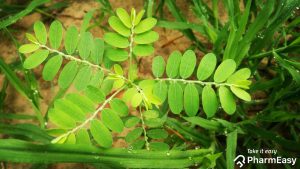
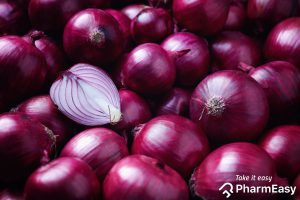


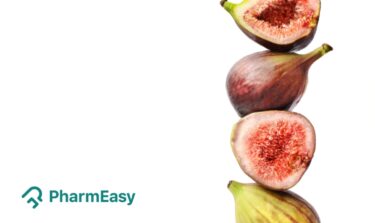

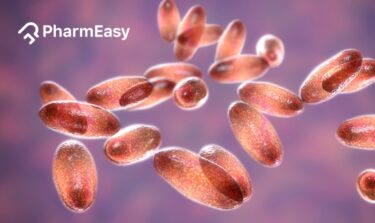


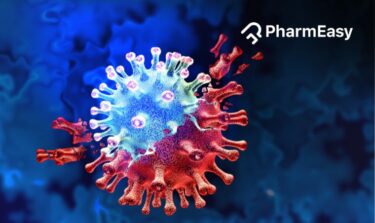

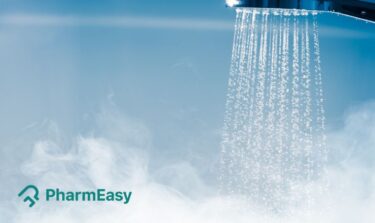







Comments